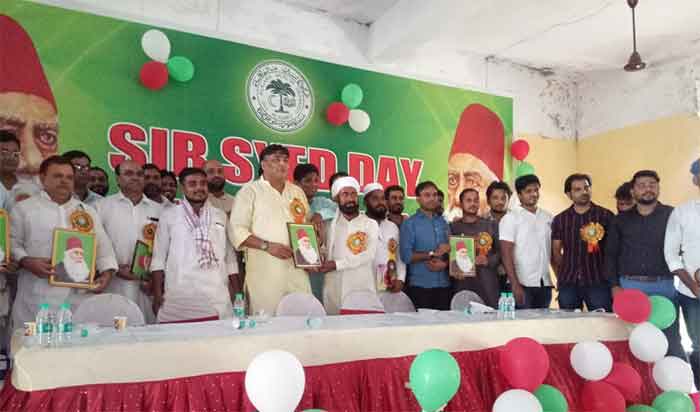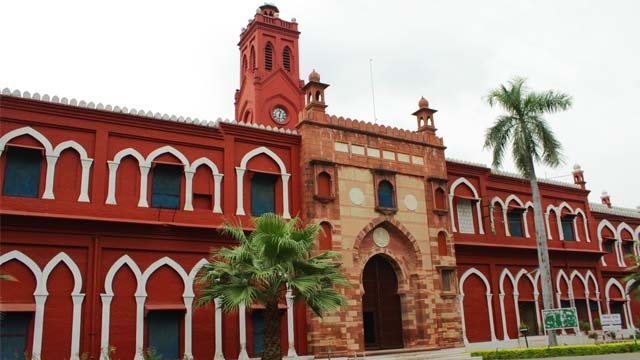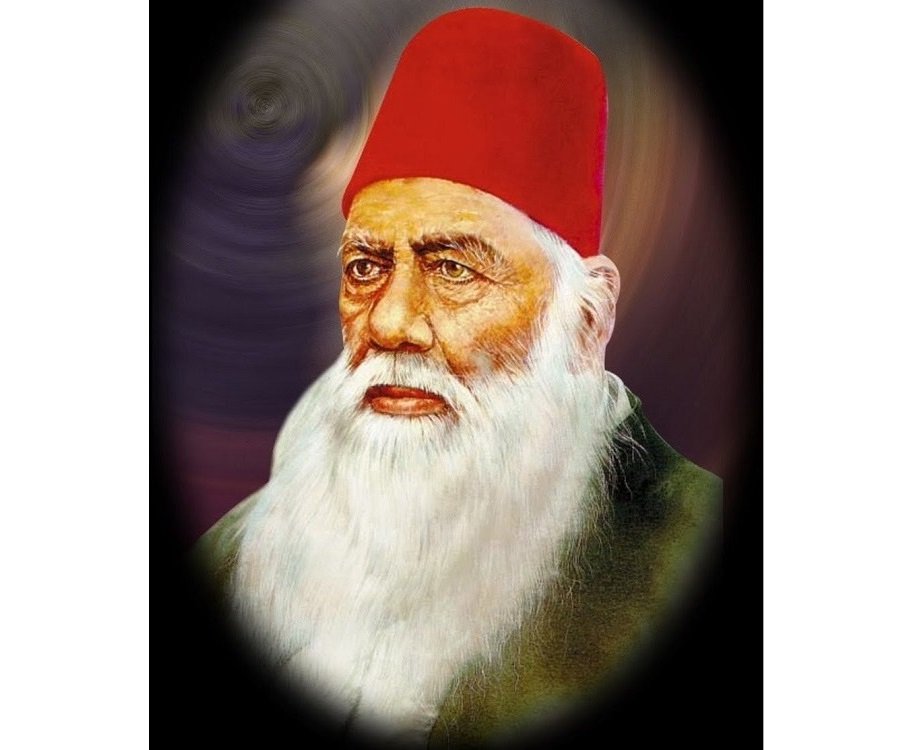
To celebrate the 204th birth anniversary of Sir Syed Ahmad Khan, the AMU Old Boys Association of Ghazipur chapter (located in eastern UP) has organized a programme in the S.K.B.M Intercollege Dildar Nagar. In this programme, literary figures, local leaders of various political parties (especially from the Congress and BSP) teachers and the large number of Alig biradary both males and females have attended and expressed their opinions. To celebrate the occasion, students of the local schools (run by the community) have recited poems and delivered powerful speeches (especially by girls students) keeping in mind the broad mission and objective of Sir Syed in the field of education, literatures and social reform.
On the said occasion, several speakers like, Asif Khan (Principal of the S.K.B.M), Master Khalid, Pervaiz khan (the BSP leader), Ashraf Ali Khan and others have put forward theirs views with regards to the contributions made by Sir Syed in his life time. Janab Asif Saheb has welcomed speakers and appreciated to the students who participated in various programmes (especially those who recited few couplets in the memory of Sir Syed).
Given the pathetic conditions of the Indian Muslims in the field of education, most of the speakers have underlined the need for taking forward the vision and mission of Sir Syed in the present times. In this respect, a young leader and a former student of Aligarh University, Janab Pervaiz Khan has underlined the importance of art and culture and also said that parents must send their children in the schools and colleges. To carry forward the mission of Sir Syed, the community (refers to biradary in Urdu) should do something concrete in this direction. While drawing the intellectual insights of Sir Syed, Ashraf Ali has said that purpose of education, is to bring out the “social change” and reform in the society rather than fulfill individualistic interests. The educated young of the community (especially who are residing in the metropolitan cities) should not delink themselves from the local people and must have connection with villages, added by Ashraf Saheb.
To appreciate the works of Sir Syed, Mahatma Gandhi said that he was the prophet of education. In a similar vein, Maulana Azad accepted that it was Sir Syed who had taken the task of spreading the modern education among the Muslim community; the points have been underlined by Samshad Saheb (who is associated with the Congress Party). Contrary to communal interpretation (especially by the Hindu Right) about Sir Syed led Aligarh Movement ( Tehrik), some speakers have said that he stood for the Hindu-Muslim unity. For him, the Hindus & Muslims are two eyes in one person (in generic terms it refers to ek dulhan ki do aakh hai).
While debunking the arguments of the Hindu nationalists (who often argued that it was Sir Syed who had initially propounded the idea of the two nation theory and responsible for the partition of India), a renowned historians like Mushirul Hasan has pointed that Sir Syed was a social reformer like Raja Ram Mohan Roy. Hence for Hasan, Aligarh movement was communitarian and in fact inclusive in nature rather than having communal outlook. More importantly, it was Sir Syed who had critiqued orthodox and conservatives’ trends within the Muslim community. In doing so, he had reconciled successfully and the overcome tensions between the modernity and Islam by interpreting Islamic theology (ilmul Kalam) in the light of reason and rationality, as underlined by Hasan. (See M. Hasan, “Muslim Intellectuals, Institutions and the Post-Colonial Predicament”, EPW, 1995)
Some speakers have reminded that after 1857 revolt (in which community was ruined badly), Sir Syed had realized that modern education in the English language and social reform are two important axis for the advancement and enhancing the competency among the Muslim community. That was the reason why the Aligarh movement (tehrik) had maintained a certain distance from the politics of that time (especially from the Indian National Congress) and concentrated more on “social reform” and educational empowerment of the Muslim community.
It has to be noted that Sir Syed had established the literary and ‘scientific society’ in Ghazipur in 1863. The purpose of establishing the scientific society was, to promote rational thinking among the Muslim masses through the translation of western literatures and modern ideas. And secondly, to interpret Islamic theology on the lines of rationalist school of thought and according to the need of modern times, as said earlier. It was the reason why a section of Ulema (religious scholars) had passed “fatwas” against him. Still, a section of Ulema hold the views that Sir Syed’s contributions in the field of education and social reform are welcomed steps and needs to be taken seriously but his understanding about Islam and Sharia should not be entirely accepted.
However, purpose of this piece is not to involve in the theological disputes rather attempt has been made to highlights Sir Syed’s contributions in the field of education, literatures and social reform on said occasion. As a public intellectual, Sir Syed had played a crucial role in the empowerment of the Muslim community, as reminded by scholars. Today, the Muslim community is lagging behind as compared to other socio-religious groups in the field of education, politics and economic sectors, as revealed by the Sachar Committee report in 2006. Given these pathetic conditions of Indian Muslims, Sir Syed’s thinking and mission, is still relevance and needs to be cherished in times to come.
Yet, a section of the lower caste Muslims (Pasmandas) are reluctant to accept Sir Syed’s views on social reform and educational movement simply because for them it was Sir Syed led movement had severed the interests of the upper caste Muslims (Ashraf Muslims) and he had prejudicial understanding about the lower caste Muslims (especially on the role of Ansaris- pejoratively called as Julaha- in 1857 revolt). Nonetheless, amidst current political scenario, it is not good time now to raise this controversy and therefore, needs to be contextualized Sir Syed’s contributions in the historical and intellectual context. On the said occasion, we have to work honestly to overcome the social and educational problems witnessed by underprivileged Muslims in particular and the larger Indian society in general.
Badre Alam Khan is a research scholar at University of Delhi













































